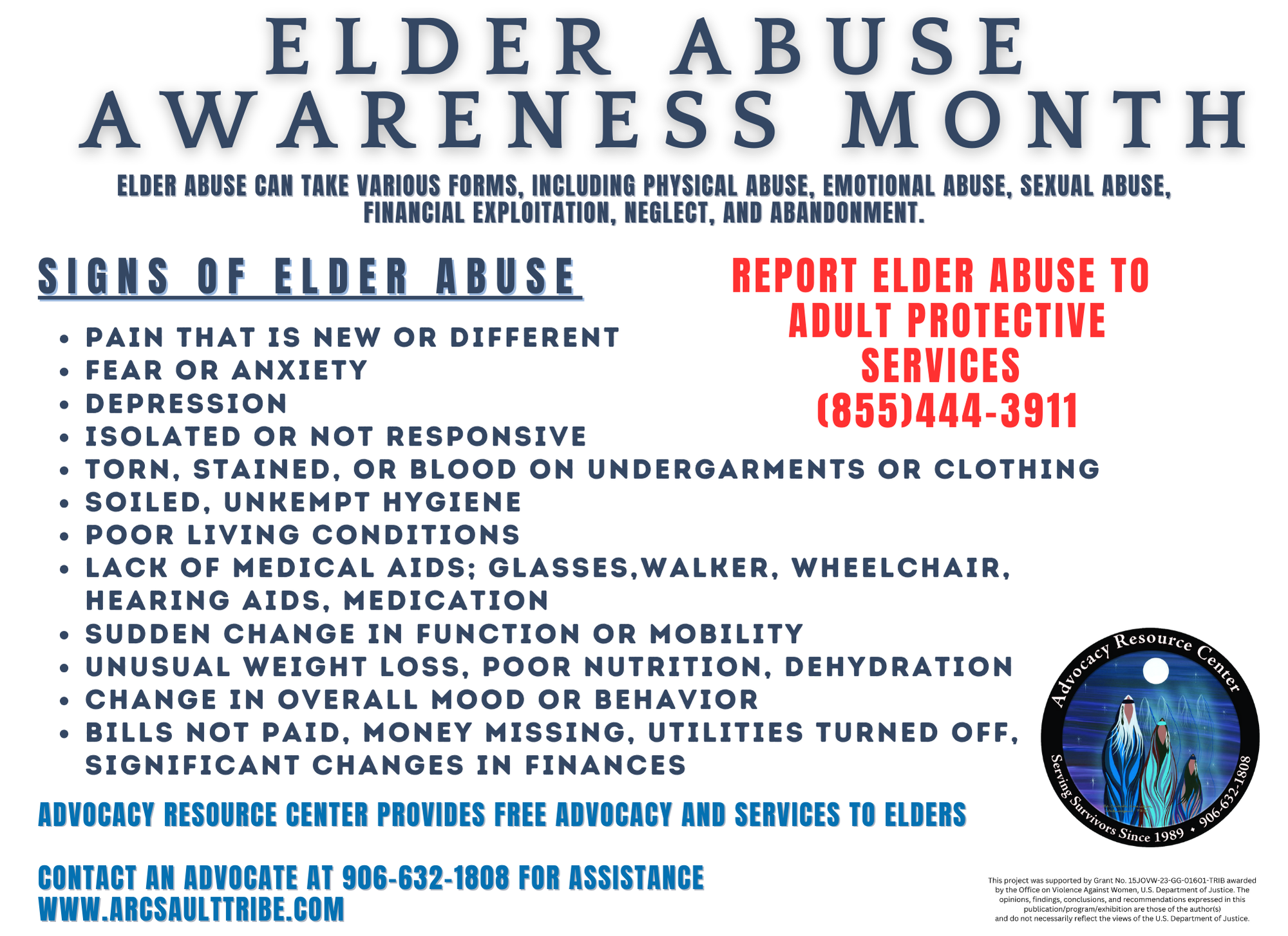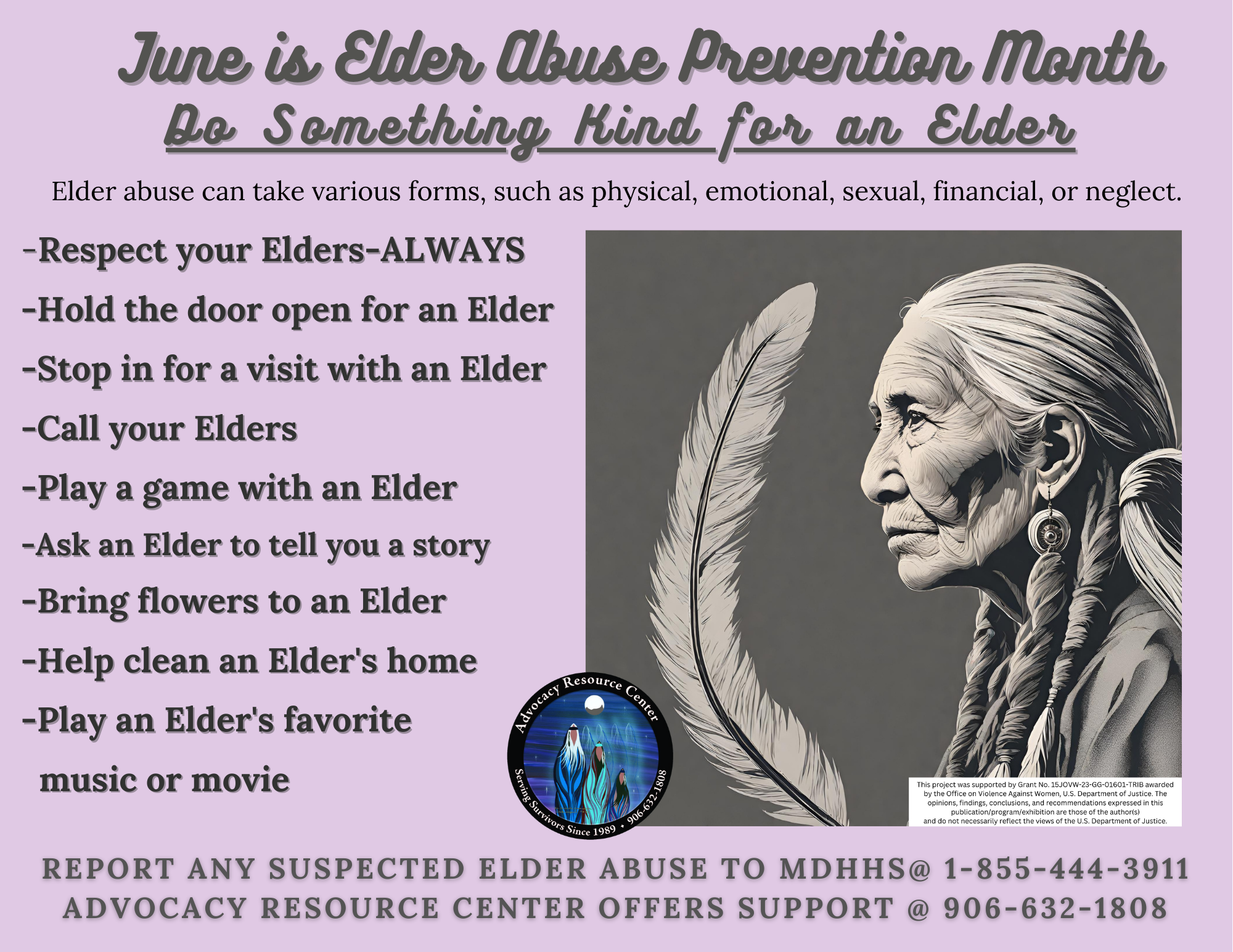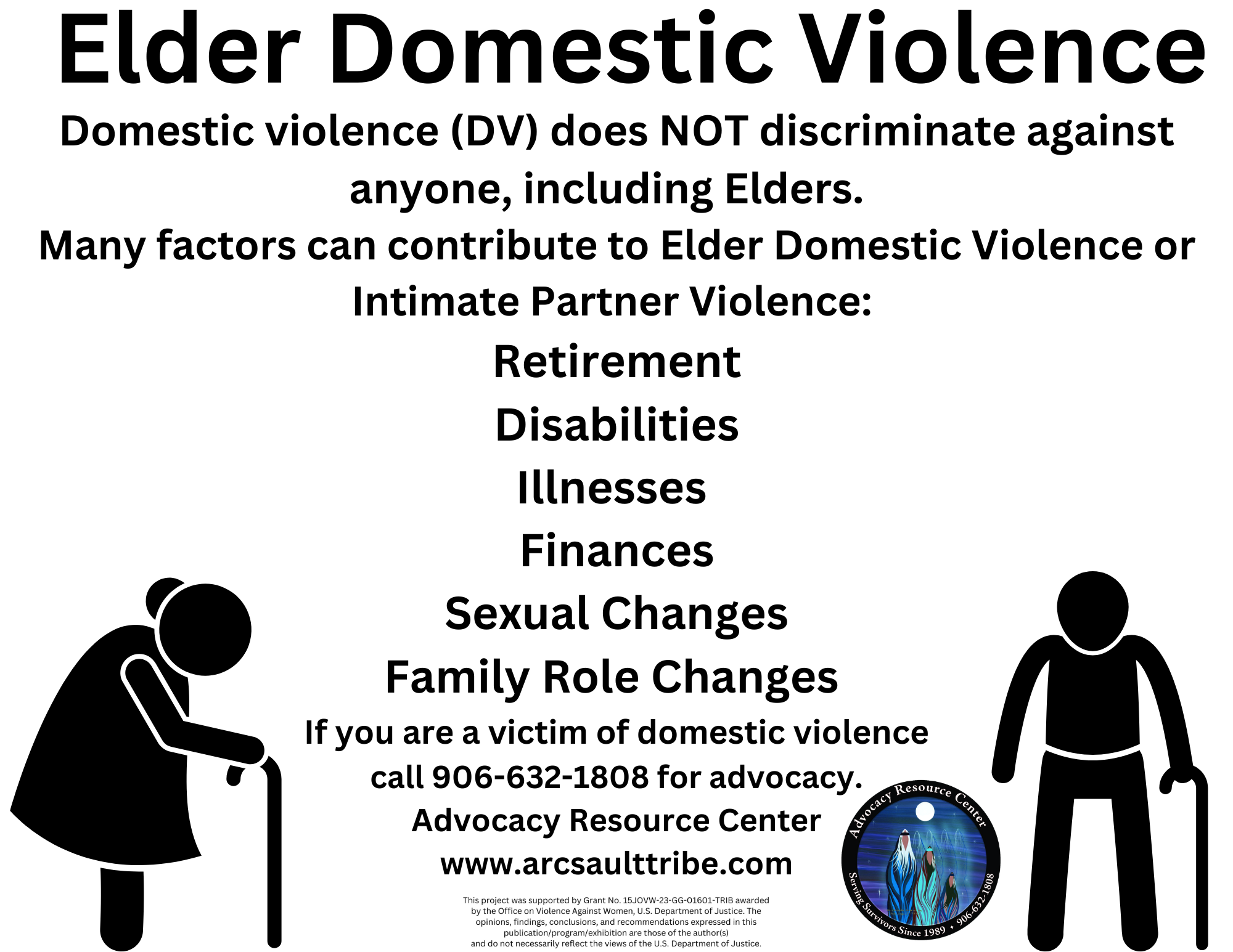June is Elder Abuse Awareness Month
June Focuses on Elder Abuse Prevention Our Elders are one of our most precious resources. Elders are the connection to our past and hold stories and facts of our family’s history. Elders should always be treated with kindness and the utmost respect. Sadly, this is not the case for many of our loved ones. An Elder is legally defined as a person 65 and older. However, in Native American communities, becoming an elder is not typically reaching a specific age but a distinct cultural status earned from wisdom, knowledge, and responsibility to others. Being an Elder is different from being elderly. “Elderly” is associated with age and the ability to care for oneself. Elder and elderly status vary from tribe to tribe. Out of respect, the term Elder will be used here.
The World Health Organization defines elder abuse as “a is a single or repeated act, or lack of appropriate action, occurring within any relationship where there is an expectation of trust, which causes harm or distress to an older person. This type of violence constitutes a violation of human rights and includes physical, sexual, psychological, and emotional abuse; financial and material abuse; abandonment; neglect; and serious loss of dignity and respect”. (https://www.who.int/news-room/fact-sheets/detail/abuse-of-older-people) Such abuse can include physical abuse, emotional or psychological abuse, sexual abuse, financial or material exploitation, neglect, self-neglect, abandonment, and spiritual abuse. Our Elders are at a greater risk for abuse due to an increase in the Elder population and limited caregiving services and support. This creates an environment for abuse and neglect.
Elder abuse is one of the least investigated forms of abuse and does not get addressed as frequently as other social issues. Research suggests that 4 to 6 percent of older people suffer from abuse, most of which goes unreported. It is reported that Elder abuse instances happen primarily in the home of the Elder, and a family member commits ninety percent of abuse and neglect incidents. Elders may not always feel comfortable reporting such abuse. Therefore, we must advocate for our seniors and give them a voice.
Often, seniors fear repercussions for reporting abuse or are too frail to do so. It is crucial for us to be aware of the signs of abuse and to report it to the proper authorities. Adult Protective Services for Michigan can be contacted at 1-855-444-3911. Sault Tribe Anishnaabek Community and Family Services provides Adult Protective Services and may be reached at (906) 632-5250 or (906) 495-1232.

Warning signs for caregivers and family members of Elders to watch for are:
Pain that is “new” or different
Fear or anxiety Depression
Isolated or not responsive Cuts, sores, or burns
Broken bones, bruises, or welts
Untreated bed sores
Torn, stains, or blood on undergarments
Dirty, unkempt hygiene
Poor living conditions
Lack of medical aids; glasses, walker, dentures, hearing aids, medication
Sudden change in function or mobility
Unusual weight loss, poor nutrition, dehydration
Change in overall mood or demeanor
Bills not paid or utilities turned off
Significant changes in finances
There are many forms of abuse against older people. They include but are not limited to:
Physical: Hitting, shoving, restraining, or confining; anything causing physical pain or impairment Emotional: Intimidation, humiliation, routine blaming, ignoring, isolating, causing anguish or distress, degrading, ridiculing, insults, using silence or profanity
Sexual Abuse: Sexual harassment, sexual activity without consent (rape), forcing elders to watch sexual acts or to undress
Financial Abuse: Stealing money, property titles, or possessions; taking over accounts or bills; spending without permission; abusing the power of attorney privilege; scamming/lying
Spiritual/Cultural Abuse: Denies access to religious services or leaders, makes fun of the victim’s values, culture, or religion, ignores or ridicules cultural or religious traditions, intimidates and threatens for practicing beliefs
Neglect: Failure to fulfill duties or obligations for elders, not caring for hygiene or condition of the home, poor nutrition, bed sores, soiled undergarments, medical neglect-missed appointments, not reporting medical issues
Self-Neglect: Refusal by Elder to care for themselves; inadequate nutrition, improper clothing, lack of or unkempt shelter, poor hygiene, not taking medication, and not following safety precautions
The Sault Tribe Elder Services consists of many programs that can assist with Elder’s needs. For more information about Elder Services, call 906‑635‑4971 or toll free 888‑711‑7356.

Please make a point to stop and visit your elders and let them know you are there for them. If they are able, go for a walk or play a game. Please encourage them to share stories about your family. With their permission, record their stories via audio or video to cherish the memories when they walk on. Bring their favorite snacks or treats to lift their spirits. Play their favorite music, brush or comb their hair, help clean their home or bedroom, or make a phone call to let them know you are thinking of them. Your kindness can truly make a difference.
The Sault Tribe’s Advocacy Resource Center (ARC) offers Elder-related victim services such as advocacy and financial services. Advocates may be reached at (906) 632-1808. For more information, visit www.arcsaulttribe.com or our Facebook page at www.facebook.com/saulttribeARC. Jess Gillotte-King, Community Educator Advocacy Resource Center
